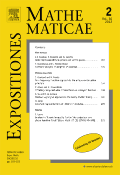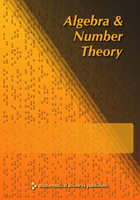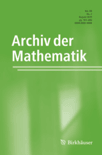
Algebraic Geometry
Scope & Guideline
Charting New Territories in Algebra and Geometry
Introduction
Aims and Scopes
- Classical Algebraic Geometry:
Explores traditional topics such as curves, surfaces, and higher-dimensional varieties, often employing techniques from intersection theory and cohomology. - Moduli Spaces and Stability Conditions:
Investigates the structure and properties of moduli spaces, including stability conditions for various geometric objects, crucial for understanding deformation theory and compactifications. - Homological Methods:
Utilizes homological algebra techniques to address problems in algebraic geometry, including derived categories, sheaves, and cohomological invariants. - Arithmetic Geometry:
Focuses on the interplay between algebraic geometry and number theory, covering topics such as rational points, Fano varieties, and Diophantine geometry. - Geometric Representation Theory:
Examines the connections between algebraic geometry and representation theory, particularly in the context of geometric invariant theory and moduli problems. - Singularity Theory and Resolutions:
Studies singularities in algebraic varieties, including resolution techniques and their implications for birational geometry. - Motivic and Tropical Geometry:
Explores modern approaches to algebraic geometry through motivic integration and tropical geometry, emphasizing their applications in enumerative geometry.
Trending and Emerging
- Mixed Characteristic Geometry:
Recent works have emphasized the study of algebraic varieties in mixed characteristic, bridging classical algebraic geometry with modern number theory and arithmetic geometry. - Homotopy and Derived Categories:
There is a notable increase in the application of homotopical methods and derived categories, highlighting a trend towards more abstract and categorical approaches to classical problems. - Geometric Invariant Theory:
Emerging themes in geometric invariant theory are gaining traction, particularly in relation to moduli problems and the study of automorphisms of varieties. - Tropical and Non-Archimedean Geometry:
A growing interest in tropical geometry and non-Archimedean methods is evident, as these topics offer new perspectives and tools for addressing classical questions in algebraic geometry. - Higher-Dimensional Varieties and Their Properties:
Research focusing on higher-dimensional varieties, particularly Fano varieties and their properties, is on the rise, reflecting a shift towards understanding more complex geometric structures. - Applications of Motivic Cohomology:
The application of motivic cohomology to various problems in algebraic geometry is increasingly popular, indicating a trend towards integrating motives with classical geometry.
Declining or Waning
- Classical Techniques in Algebraic Geometry:
There is a noticeable decrease in papers utilizing classical techniques such as projective geometry and classical intersection theory, as researchers increasingly explore more modern frameworks and tools. - Local Cohomology and Local Properties:
Research focusing on local cohomological techniques and local properties of varieties has become less frequent, possibly due to a broader interest in global properties and derived categories. - Rationality Problems:
While rationality remains a core topic, specific rationality problems related to lower-dimensional varieties have seen reduced attention, as the focus shifts to broader applications and higher-dimensional contexts. - Special Varieties and Their Classifications:
The classification of special types of varieties, such as specific classes of Fano varieties, appears to be less explored, possibly due to the increasing complexity of the subject and a pivot towards more general theories.
Similar Journals

EXPOSITIONES MATHEMATICAE
Connecting Scholars Through Mathematical InsightsEXPOSITIONES MATHEMATICAE, published by Elsevier GmbH, stands as a significant journal in the realm of mathematics, catering primarily to researchers, professionals, and students. With an ISSN of 0723-0869 and an E-ISSN of 1878-0792, this journal has made its mark in the academic community, boasting a Q2 classification in the miscellaneous mathematics category for 2023, illustrating its prominence within its field. The journal addresses a diverse scope of mathematical topics, encouraging the publication of original research and innovative theories while maintaining rigorous academic standards. As it converges from 2004 to 2024, EXPOSITIONES MATHEMATICAE continues to be an essential resource for advancing mathematical knowledge and fostering scholarly communication, despite being a non-open-access publication. Its location in Munich, Germany further anchors it within a rich intellectual tradition, providing accessibility for the mathematical community worldwide.

Forum of Mathematics Sigma
Advancing mathematical frontiers for a global audience.Forum of Mathematics Sigma is a premier open access journal published by Cambridge University Press that has been at the forefront of mathematical research since its inception in 2013. With a strong emphasis on advancing the fields of mathematics, the journal consistently achieves Q1 rankings across multiple categories, including Algebra and Number Theory, Analysis, and Computational Mathematics. This distinction highlights its impact and relevance within the scholarly community. The journal prides itself on providing a platform for innovative research, fostering collaboration among researchers and practitioners across various mathematical disciplines. Open access publication ensures that cutting-edge findings are widely available to readers globally, enhancing the dissemination of knowledge. With an address in the heart of Cambridge, England, Forum of Mathematics Sigma is dedicated to promoting high-quality research and making significant contributions to the development of mathematics.

Selecta Mathematica-New Series
Advancing Understanding in Dynamic Scientific Fields.Selecta Mathematica-New Series is a premier academic journal published by Springer International Publishing AG, based in Switzerland. With an impressive impact in the fields of Mathematics and Physics, it is recognized in the Q1 category for both Mathematics (Miscellaneous) and Physics and Astronomy (Miscellaneous) as of 2023. Established in 1995, the journal provides a platform for rigorous peer-reviewed research, facilitating the dissemination of groundbreaking findings and theoretical advancements through its converged publication years up to 2024. Researchers and scholars seeking to stay at the forefront of mathematical and physical sciences will benefit from the journal's diverse scope and high-impact articles. Although it does not operate under an open-access model, Selecta Mathematica-New Series remains a vital resource for building knowledge and fostering collaboration among professionals and students engaged in these dynamic fields. Access to its content is essential for those aiming to deepen their understanding and contribute to the ongoing dialogue within the scientific community.

Documenta Mathematica
Elevating Scholarly Discourse in MathematicsDocumenta Mathematica is a premier academic journal published by the European Mathematical Society (EMS), making significant contributions to the field of mathematics since its inception. With an Open Access model established in 1996, the journal ensures that scholarly works are freely available to a global audience, promoting widespread dissemination of mathematical research. Based in Germany, it serves as a vital platform for mathematicians, covering a wide array of topics within the discipline, evidenced by its impressive Q1 ranking in the miscellaneous category of mathematics as of 2023. Featuring rigorous peer-reviewed articles that span the latest trends and breakthroughs in the discipline, Documenta Mathematica also retains a commendable position among its peers with a Scopus rank of 163 out of 399, placing it in the 59th percentile for general mathematics. Researchers, professionals, and students alike will benefit from the robust scholarly content and the journal's commitment to advancing mathematical knowledge.

Cambridge Journal of Mathematics
Connecting Ideas to Shape the Future of MathematicsCambridge Journal of Mathematics, published by INT PRESS BOSTON, INC, is a premier platform for the dissemination of cutting-edge research in the field of mathematics. With an ISSN of 2168-0930 and E-ISSN 2168-0949, this journal stands out in a competitive academic landscape, currently ranked #58 out of 399 in General Mathematics, placing it in the top 15% within its category according to Scopus metrics. The journal serves as a vital resource for researchers, professionals, and students alike, aiming to foster groundbreaking mathematical inquiries and foster collaboration across disciplines. Published from 2020 to 2024, the Cambridge Journal of Mathematics is committed to maintaining high standards of scholarship, making it an essential read for those who are passionate about advancing mathematical knowledge and its applications.

New York Journal of Mathematics
Fostering innovation in the world of mathematics.New York Journal of Mathematics is a prominent open-access journal, published by the ELECTRONIC JOURNALS PROJECT, dedicated to advancing the field of mathematics through the dissemination of groundbreaking research. Since its inception in 1996, the journal has evolved into a valuable resource for researchers, educators, and students, particularly in the realm of general mathematics. As of 2023, it proudly holds a Q2 classification in the Mathematics (miscellaneous) category, reflecting its growing impact and reach within the academic community, despite being ranked at the 31st percentile overall. With its commitment to open access since 2022, the journal ensures that high-quality mathematical research is readily available to a global audience, fostering collaboration and innovation. Researchers interested in contributing to this dynamic field will find the journal a vital platform for sharing their findings and engaging with fellow mathematicians around the world.

RENDICONTI DEL SEMINARIO MATEMATICO DELLA UNIVERSITA DI PADOVA
Exploring the frontiers of mathematics with open access insights.RENDICONTI DEL SEMINARIO MATEMATICO DELLA UNIVERSITA DI PADOVA, published by the European Mathematical Society, stands as a notable open-access journal with a rich history in disseminating research across various domains of mathematics. With an ISSN of 0041-8994 and E-ISSN 2240-2926, this journal has embraced open access since 2023, significantly enhancing its visibility and accessibility to a global audience. Situated in Germany, its publishing house is based at Technical University Berlin, which emphasizes its academic roots and dedication to fostering mathematical research. The journal features a quartile ranking of Q3 across multiple categories including Algebra and Number Theory, Analysis, Geometry and Topology, and Mathematical Physics as of 2023, indicating a vibrant contribution to the field, despite its challenge in specific rankings. Researchers, professionals, and students alike will find in this journal a platform for innovative ideas and significant findings that are crucial to the evolution of modern mathematics.

Journal of Homotopy and Related Structures
Exploring the Depths of Mathematical StructuresJournal of Homotopy and Related Structures is a distinguished academic journal published by Springer Heidelberg, specializing in the fields of algebra, number theory, geometry, and topology. With a focus on the intricate relationships and structures within these disciplines, the journal aims to facilitate the dissemination of original research and provide a platform for scholarly exchange among mathematicians. Since its inception in 2012, the journal has positioned itself in the Q2 category for both Algebra and Number Theory and Geometry and Topology in 2023, reflecting its growing influence and commitment to high-quality publications. Although it operates under a subscription model, the research published in this journal is highly cited, contributing to its notable rankings—#57 in Geometry and Topology and #65 in Algebra and Number Theory on the Scopus index. This journal is an essential resource for researchers, professionals, and students who wish to stay updated with the latest advancements and trends in homotopy theory and related mathematical structures.

Algebra & Number Theory
Connecting Scholars Through Cutting-Edge Mathematical InsightsAlgebra & Number Theory, published by Mathematical Science Publications, stands at the forefront of mathematical research, particularly in the fields of algebra and number theory. With an ISSN of 1937-0652 and E-ISSN 1944-7833, this esteemed journal provides a dedicated platform for the dissemination of cutting-edge theoretical advances and practical applications. It has achieved a Q1 category ranking in both algebra and number theory according to the 2023 quartiles, reinforcing its critical role in shaping contemporary mathematical discourse. The journal serves as an essential resource for researchers, professionals, and students alike, offering insights into diverse mathematical methodologies and fostering open dialogue among scholars. Although it does not provide open access, its robust impact factor reflects the high quality and relevance of its published work. Based in the United States at the University of California, Berkeley, the journal's commitment to excellence continues to attract contributions that push the boundaries of mathematical understanding.

ARCHIV DER MATHEMATIK
Advancing Mathematical Frontiers Since 1948ARCHIV DER MATHEMATIK is a distinguished journal published by SPRINGER BASEL AG, renowned for its contributions to the field of mathematics. Established in 1948 and continuing its legacy through to 2024, the journal provides a platform for innovative research and scholarly articles that push the boundaries of mathematical theory and application. With an ISSN of 0003-889X and an E-ISSN of 1420-8938, it holds a reputable position within the academic community, reflected by its Q2 ranking in the 2023 Mathematics (Miscellaneous) category. Despite not being an open access publication, ARCHIV DER MATHEMATIK remains accessible to a global audience through various databases, ensuring the dissemination of high-quality research. The journal’s commitment to enhancing mathematical discourse makes it an essential resource for researchers, professionals, and students seeking to expand their understanding of this vital discipline.